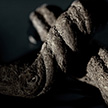Why and How?
What are their effects?
Ayahuasca and iboga are plants that have been used in traditional contexts since ancient times for medical, social and religious purposes. Their effects on consciousness have been known by indigenous cultures, who consider these to be responsible for the healing properties of these plants.
Both ayahuasca and iboga induce an intense introspective experience that can provoke reactions such as recollection of biographical elements (e.g. childhood trauma), as well as re-experimentation of repressed emotions, perinatal states and transpersonal experiences—those that go beyond one’s own self. You can read more about their effects in Interested in taking Iboga or Interested in taking Ayahuasca.
Why do these effects have therapeutic potential?
The role of the ayahuasca or iboga experience can be described as a catalyst of the therapeutic process.
Through these plants, we can access subconscious materials which could take a lot of time to emerge in the consciousness. Working with these materials represents an opportunity to adjust dysfunctional patterns that provoke suffering.
The experience by itself can be considered therapeutic by the person experiencing it, but due to the intensity such an experience can have, it is necessary that it is framed in a wider therapeutic process to maximize this therapeutic potential. Obtaining a lasting positive outcome just by having an experience with these plants is not something that is guaranteed; it is the therapeutic process that allows a consistent improvement of the conditions of the person. This process has three phases: preparation, the experience with the plant, and the integration.
The combination of these three phases determines how therapeutic the outcome will be. Therefore, special attention should go to the context in which this therapeutic process will take place. This includes the motivation of the interested person, the center where the experience will be facilitated, and, more importantly, those responsible for facilitating the session, whether it be shamans, healers, therapists or psychologists.
As with all forms of therapy, miracles do not exist. The use of ayahuasca and iboga has potential benefits and risks that should be considered. You can read more about this in the texts Interested in taking Ayahuasca and Interested in taking Iboga.
My Relative wants to do a Session
When a relative or a friend brings you the news that he/she wants to have an experience with these plants, having a receptive attitude towards understanding their motivation, wishes, reflections and expectations can be useful. This allows us to evaluate how well that person has informed themselves, and if it would be useful to offer more extensive information or proceed to inform ourselves better as well.
If these plants are unfamiliar to us, it is normal if a certain level of anxiety comes up regarding the potential effects. There is a lot of information about these botanical materials that includes myths or is not objective, which might have colored our personal impression of such plants. Therefore, it is a good idea to gain objective information by reading specialized pages about this subject matter. This information will give us a better understanding of the phenomenon. It is possible to conclude that this type of therapy or personal growth modality is not suitable for a person. This might be something we can share with him/her, but with the information we can get a better understanding of why the person sees this option as a useful one for him/herself. Even in this case, it can be constructive to let the interested person know that whatever decision they make, we will support them.
For the person who has decided to take ayahuasca or iboga, it is important to know that they can count on the support of their relatives and loved ones. Many people take the use of these plants into consideration as a last resort, after having tried other forms of therapy without obtaining satisfying results. This is especially true in the case of iboga. If a relative shares their decision to participate in a session, it is probable that an important internal process of reflection about this choice has been done, recognizing that they might have a personal issue that they want to address. A positive attitude and support on behalf of the family can be of great help for the preparation phase of the experience.
Advising my Relative or Friend
In certain occasions, we might have the feeling that an ayahuasca or iboga session might be useful for a loved one, and consider proposing them with this idea. In this case, we should analyze the situation to make sure that it really responds to a need the person has, and is not a projection of personal interest. It is not wise to take for granted that something that has been beneficial for us and that someone we know will have the same outcome. Particularly when dealing with plants that alter consciousness, such as ayahuasca or iboga, the results can sometimes be unpredictable.
The decision to take ethnobotanicals such as these should always be made by the individual. It is not useful or ethical to pressure a person to initiate a personal process involving non-ordinary states of consciousness.
If we really believe that the use of ayahuasca or iboga could be useful for someone in our environment, we should first make sure that we are sufficiently informed ourselves, and facilitate the possibility for that person to have access to objective information about the potential risks and benefits. That way, he/she can form their own opinion. We can share our personal experience and how it has been for ourselves or someone we know, but without pressuring them to do a session or promise benefits that may not be part of their own outcome.
Ayahuasca and iboga have their therapeutic indications as well as contraindications, and are reported to be capable of provoking improvements in people’s lives. The type of personal issue and suitable therapy options are not the only important factors; the context in which this therapy is offered is as well. For example, for a person who has suffered trauma in the course of their life, an ayahuasca or iboga session may not be suitable due to the fact that they will not receive any professional attention for a period of time after the session.
How to support?
The role of the relatives or close friends of the person that has taken ayahuasca or iboga is crucial for the therapeutic process to properly develop itself. In some cases, the experiences induced by the ingestion of these ethnobotanicals can be overwhelming and go way beyond the expectations of the person. It is therefore often difficult to give words to what one has lived during the experience.
The role of the family or close friends should facilitate the integration process. This means to allow the individual to be able to rely on a safe and loving environment after the session so that the pieces of the experience can fall into place like a puzzle.
Our presence is not so much about trying to understand or analyze what has occurred during the experience, but rather to listen to the person with care and empathy. Being able to share your experience with someone who listens without judgment and with respect can be of great value, even if there is not much feedback. What-to-do’s, precipitated advice or interpretations that reduce the importance of the experience are usually not very helpful.
In many cases, all that is needed for a person to feel supported in his/her integration process is a safe environment, space and time.
Some moments in the integration process can be delicate; the person can be sensitive and experience intense emotions. This is a normal part of the process of integrating the changes one wants to make in their life. The family can help in these sensitive moments by simple means, such as facilitating daily life, making sure he/she eats a healthy diet, drinks enough fluids, etc.
Choosing a Place
With the decision to enroll in a therapeutic process that involves the use of ayahuasca or iboga comes the selection of the place and person to do it with.
Taking the large quantity of centers that offer therapy with ayahuasca and iboga into account, it is of vital importance to get well informed regarding:
- The services that they offer: do they offer some type of support alongside the ayahuasca or iboga session? Do they give importance to the preparation and integration? Over what duration? Do they do a pre-screening? Is there a follow-up procedure?
- The staff or people involved: are they professionals? What training and experience do they have? Do they appear to be people you can trust?
- Format of the sessions: how do they do it? How many people participate? Do they form part of a religious group? How are the sessions done? Who guides them? What roles or interventions can be expected from the facilitator and participants?
- Type of information is provided: do they promise specific outcomes? Do they inform about the potential risks? Do they have contraindications?
- Previous experiences of other participants.
Common sense is always a good advisor. If we don’t trust a center or person that does the session, the best thing to do is to find someone else who inspires us and gives us more confidence. A certain center or person, even though maybe recognized and famous, can be not very suitable for us or our relative.
Disclaimer
ICEERS takes care to ensure that the information presented on this website is accurate at the time of its publication. However, over time new scientific and medical information becomes available, and laws and legal enforcement polices change. In addition, laws and legal enforcement policies governing the use of substances discussed on this website vary from jurisdiction to jurisdiction. The reader is advised to carefully consult appropriate sources for the most current information on scientific, medical, and legal issues. Material on this website is not intended to and should not be used as a substitute for personal consultation with knowledgeable physicians and attorneys.
The information on this website is offered for informational use only, and is not intended for use in diagnosing any disease or condition or prescribing any treatment whatsoever. The information on this website is not intended to encourage the use of ethnobotanicals. ICEERS specifically cautions against the use of ethnobotanicals in violation of the law, without appropriate professional guidance and monitoring, or without careful personal evaluation of potential risks and hazards. ICEERS specifically disclaims any liability, loss, injury, or damage incurred as a consequence, directly or indirectly, of the use and application of any of the contents of this website.



